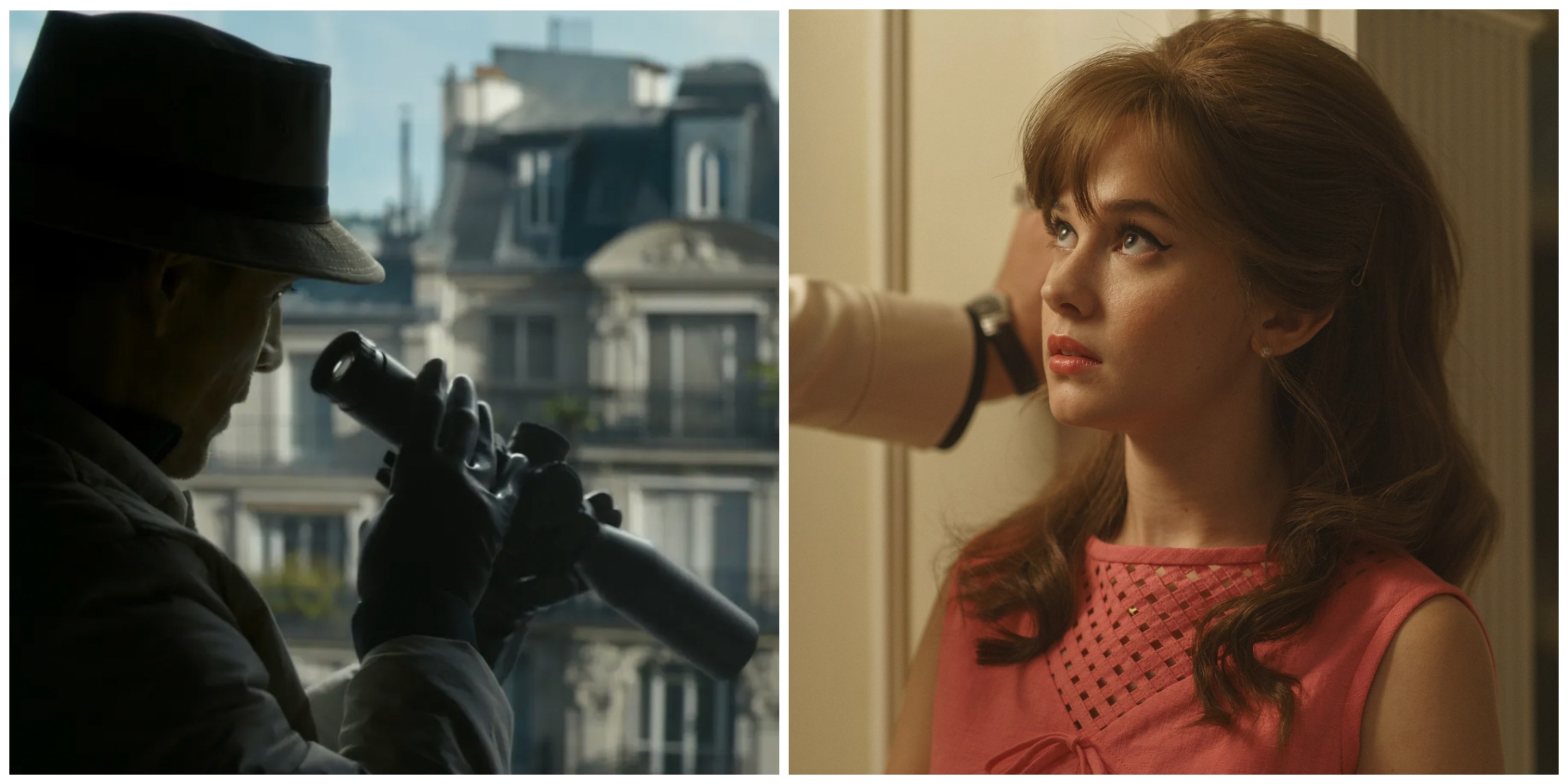There comes a point in every auteur’s life where you just gotta strip it down to the essentials. You step away from all the genre exercises, the work-for-hire detours, the unfunded passion projects and do what you do best, which is … what you’ve already done, but, like, more mature now. Sofia Coppola and David Fincher have reached that career point: Priscilla is a pure distillation of Coppola, The Killer as Fincherian a flick as ever he’s flicked. It’s a move the cynical might call leaning on your brand and the respectful classify as refining your style. Yet say what you will about either director (I certainly will), these are artists revisiting genuine fascinations, whether you share them or not.
Sofia Coppola. Priscilla Presley. It’s a testimony to the director’s rarefied interests that just setting those two names beside each other allows you to almost imagine the movie. Elvis’s carefully groomed (in whichever sense of that word you prefer), Graceland-imprisoned bride epitomizes the privileged, beautiful, yet captive girl who has been Coppola’s idée fixe since The Virgin Suicides. We know better by now than to expect a simulation of psychological depth or development—Coppola was “just vibes” way back before anyone said “just vibes.” Instead, we’re immersed in the experience of being Priscilla Presley, of seeing Priscilla Presley, of being seen as Priscilla Presley.
As Priscilla begins, a moment of Alice Coltrane segues into Joey Ramone singing the Ronettes’ “Baby I Love You,” all the better to accentuate the artifice of the presentation. A bare foot sinks into the plushest of shag carpets before entering a heel. And here is Cailee Spaeny’s Priscilla herself, drawing the cat eye sharp enough to kill a man, Aquanetting her bouffant to a suitable space-age height, expertly selecting her lashes. But “herself” is a loaded word here. Do we see her becoming Priscilla? Creating Priscilla? Resigning herself to being Priscilla?
As we’ll soon learn (if we didn’t know already), that iconic look was foisted upon Priscilla by Elvis himself. As his goons chortle behind him, we watch the King lounge at his leisure (and no onscreen Presley has ever lounged with as regal a sprawl as Jacob Elordi) while his girl puts on a fashion show. He chooses her dresses and rejects the ones she likes. He instructs her to darken her hair and layer on the mascara. He even provides her with pistols to match her outfits. What might have seemed like an act of self-creation earlier is instead one of obligatory role-playing; the vision of Priscilla that makes her so cinematic has been crafted by a man. What, in the Coppola Cinematic Universe, could be more humiliating, more self-obliterating for a woman than not being allowed to choose your own clothes?
But Coppola doesn’t just show us women prepared for battle, so to speak, in their fully embodied outfits; she also cherishes the quiet sensuality of women who don’t know they’re being observed. Any man who began his movie, as Coppola did Lost in Translation, with a carefully framed shot of Scarlett Johansson’s barely undie-concealed butt would seem like a creep. But there’s an intimacy to Coppola’s voyeurism, tinged with quiet envy, identification, and sympathy, and it comes to the fore in Priscilla.
Coppola is so attuned to the power of constructed images of femininity that she can acknowledge what makes a teen attractive without leering. When we first see 14-year-old Priscilla Beaulieu in Germany, she’s a pure vision of an Elvis fan: ponytailed, be-ribboned, pink-sweatered, glancing with wide but alert eyes over her shoulder from a stool in a soda shop. Prior to Priscilla’s makeover, Coppola self-consciously recycles images of the eroticized virginity of the school girl, including the classic pose of doing homework while lying forward on the floor, knees bent upward and ankles crossed.
As Priscilla, Spaeny turns one of those terrific, restrained performances that’s hard to find the right words to praise because what makes it succeed isn’t what she does but what she doesn’t. This is a role that requires her to never hit a wrong note visually, to resist the urge to fill empty space with “acting.” (Compare her to the clunky star turns of Natalie Portman in Jackie or Kristen Stewart in Spencer.) Though 25, she’s wholly credible as a girl who wants to be a woman but isn’t yet. When Priscilla steps off the plane in Germany, after a visit to the U.S. that she spent popping speed and high-rolling with the King in Vegas, her parents behold the smeared mascara and fancy dress of a girl who looks like she’s come home at dawn from one hell of a prom.
Except you get laid at prom, and Elvis keeps poor Priscilla’s nethers carefully intact till they’re wed. A typical Coppola heroine, Priscilla is drastically undersexed, tortured by the news pop magazines bring her of Elvis’s dalliances with Ann Margret and Nancy Sinatra. The two do share some charged moments, as when, in a sexy counterpoint to the dress-shopping scene, they snap Polaroids of each other in bed and Cilla puts on a naughty little fashion show. But in a scene where she’s simmering in a scant little nightie while Elvis insists on poring through books on Eastern spirituality, Elvis’s conjugal chastity is practically comic. “Keep the home fires burning,” he instructs her, oblivious and jolly, on a call from Hollywood. “The flame’s burning on low” she seethes back.
If you’ve repeatedly thought “Oh, like in Marie Antoinette” while reading this, well, yes, Coppola is particularly reworking the motifs she employed in that earlier skewed biopic. Graceland, like Versailles, is a gilded prison with its own rules, but, also like Versailles, it's never truly gothic. Priscilla is scolded like a child rather than tormented like an inmate. (The darkest moment comes when Elvis’s daddy, Vernon, shoos her away from where work is being done.) The anachronistic needle drops here, such as "Crimson and Clover” soundtracking Elvis and Cilla’s first kiss, are less intentionally jarring than Strokes or Bow Wow Wow; doo-wop and teen idol coos predominate. (Elvis’s own recordings were off-limits to Coppola.)
Priscilla demystifies Elvis Presley, but it can’t quite humanize him. He feels less like a man than an event that repeatedly happens to Priscilla. Each time he returns from a movie shoot or tour, he’s got new passions, new preoccupations, new complaints. He compartmentalizes his needs and uses his charm and power to keep everything in its place, especially Priscilla—his “little one,” as he calls her, exists to represent an unspoiled “home” to him. His spurts of anger are unanticipated, violent, and stupid, with his need to reconcile almost immediately afterward just as scary and manipulative. Like Austin Butler in last year’s Elvis, Elordi lacks the true King’s baby fat (why are today’s hot bois so lean?), but his height helps translate Priscilla’s vulnerability into visual terms: Spaeny is tiny (5’1” to Priscilla’s 5’ 4”) and Elordi hovers five inches above Elvis’s even six feet.
As the ’60s tumble toward the ’70s things start happening fast: marriage, Lisa Marie, the comeback special, jumpsuits, Las Vegas, L.A., karate, divorce. Coppola navigates this familiar territory with wry economy: She telescopes Elvis’s entire Vegas career into one amazing “Thus Spake Zarathustra”-soundtracked moment. But the need to tick off biographical boxes makes this overall segment feel rushed—if anything, Priscilla is too thorough, too concerned with telling the full story rather than flashing the essential imagist moments that convey its essentials.
Eventually we watch a newly divorced Priscilla, her natural hair flowing with Nixon-era freedom, in a blouse and slacks that Elvis certainly wouldn’t have signed off on, driving through the gates of Graceland for the last time, as Dolly Parton’s voice soars overhead. Like Dolly, Priscilla will always love him, and a bit of backstory lends an additional tinge of regret: Parton had hoped Elvis would record “I Will Always Love You,” but balked when Presley’s manager, Colonel Tom Parker (an unseen but ever-present force throughout Priscilla), demanded half of her publishing. So this is a reverie about what could have been, and it’s hard to feel Priscilla’s escape as the triumph of the woman over the icon, because liberation is such an un-Coppola-like concept. In fact, you sense that Priscilla might have been happy as his idealized little one if only he’d remained her idealized Elvis.
Aren’t murderers fascinating? Well, no, not especially, but let’s humor David Fincher for a moment here. Gotta give a guy his schtick, and lord knows the world doesn’t need any more Manks. The conceit motivating Fincher’s latest, The Killer, is that the titular and unnamed assassin at its center is, for all his specialized skills, merely another gig worker in the 21st century economy. His is a job that he’d like to imagine as a vocation, and underlining that irony is the fact that he’s played by Michael Fassbender, an essentially perfect human.
Lest you miss the connection, the assassin is operating out of a vacant WeWork as the movie begins, waiting for the ideal moment to off his target across the street. As we sit with him, anticipating the moment he pulls the trigger, he fills our ears with an insufferable Rorschach-like internal monologue about his craft, using much the same tone as one of those guys on YouTube who seem overly concerned about your “gut health.” (“You’re trapped in here with me” indeed.)
Despite the fastidious professionalism our Killer has been droning on about at length, however, he flubs the shot, and that sets the movie in motion. He stealthily eludes the police, swiftly disposes of evidence, and briskly passes through airports with practiced anonymity, and along the way Fincher’s technique is every bit as cagey and efficient. Then our antihero returns to his home in the Dominican Republic to discover that a planned hit occurred in his absence, rendering his girlfriend comatose. Looks like we got a good old revenge plot on our hands, folks.
You can’t accuse Fincher of lacking a sense of humor. The Killer focuses by listening to The Smiths on his iPod, and the tracks have ironic parallels to the action. (Yes, “Girlfriend in a Coma,” for instance.) He uses the names of ’70s sitcom characters (Reuben Kincaid, Archibald Bunker, Howard Cunningham, waka waka waka) as his aliases. So, yes, you can accuse Fincher of not being very funny. The major running irony here is that even as we hear Fassbender mentally recycle the koans of his trade, such as “anticipate, don’t improvise,” he’s breaking those rules in how he acts.
The big no-no The Killer allows himself is to take things personally. While the characters he offs in his pursuit of vengeance are an impersonal lot as well, all referred to, a la Chaucer, by their roles rather than their names, the supporting actors do perk things up a bit. Charles Parnell is The Lawyer who arranges the business side of the Killer’s kills. Tilda Swinton’s personality is irrepressible as The Expert, the rival assassin who was sent to kill the Killer. Fassbender has an imaginative tussle with Sala Baker’s The Brute, the muscle that Swinton employed in the Dominican. And eventually he tracks down Arliss Howard (in a Sub Pop T-shirt, a cute touch) as The Client, a colorless middle-aged financier who only half-realizes he ordered the hit, and there the Killer relearns the lesson that there really was nothing personal to this story at all.
In working its way up to this pat little irony, The Killer is as efficient as a PowerPoint. And its jokes work in the same way as a corporate presenter’s practiced lines, adding color to keep the audience engaged. Forget whodunnit. Fincher makes howdunnits. He’s so much more interested in the way things happen than why they do. I sometimes wish he’d pare away his slick style and do his own version of Bresson’s Pickpocket.
The Killer has helped me pin down why I’ve been ambivalent about Fincher over the years. His obsession with m.o. made Fincher seem ideal for Gone Girl, a mystery about a murder that didn’t happen, but when a guy can turn Ben Affleck into a hangdog patsy and not make me giggle, there’s some kind of aesthetic disconnect between us. Somehow, Fincher is never quite nasty enough, or takes too little delight in the nastiness he employs. It feels like a means to an end.
What leaves me cold about Fincher is that he doesn’t have the courage of his own misanthropy. He’s incapable of the haughty Olympian dispassion of a Kubrick; he’s too austere for the formal calisthenics of a De Palma. (And unlike Hitchcock he’s, well, not Hitchcock.) But he doesn’t seek to redeem his bloodthirstiness with post facto humanism like Tarantino, either. His characters gaze into the dark heart of humanity and, in the end, just kinda shrug it off.
With each step he takes, The Killer reveals some specialized knowledge, and you get the sense that what ultimately fascinates Fincher about murder is that, like making a movie, it’s hard to get away with. (So hard, in fact, that you wonder why anyone takes the trouble.) The Killer is Fincher himself, a well-compensated workman generating content for Netflix. It’s worth remembering that Fincher’s one truly great movie, Zodiac, is about how obsessing over the mind of a killer will ruin your life and your work. Shrug.
GRADES
Priscilla: A-
The Killer: B-
Priscilla and The Killer are now showing in area theaters.







